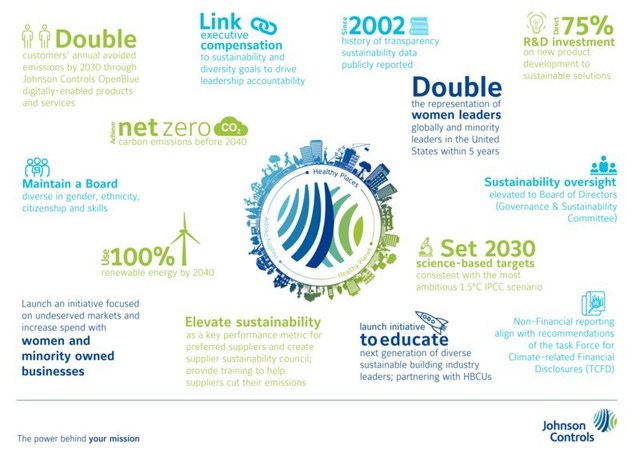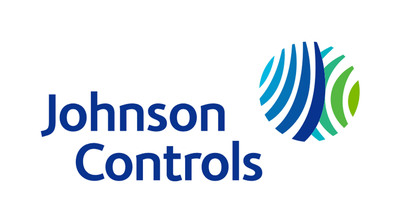Johnson Controls' Science-based Emission Reduction Targets Approved
Johnson Controls (NYSE: JCI) announced that the Science Based Targets Initiative (SBTi) has approved its greenhouse gas emissions reduction targets, aligning with the Paris Agreement's goals. The company aims to reduce operational emissions by 55% and customer emissions by 16% by 2030. The SBTi validation reinforces Johnson Controls’ strategy for sustainability and its commitment to net-zero emissions. The OpenBlue platform will play a key role in achieving these objectives, promoting healthier environments. Johnson Controls has also joined the Business Ambition for 1.5°C campaign and is committed to reaching net-zero carbon emissions by 2040.
- SBTi approval validates ambitious emissions reduction targets.
- Target to reduce operational emissions by 55% and customer emissions by 16% by 2030.
- OpenBlue platform will enhance sustainability efforts and improve building health.
- Participation in global climate initiatives, including Business Ambition for 1.5°C.
- None.
CORK, Ireland, March 31, 2021 /PRNewswire/ -- Johnson Controls (NYSE: JCI), the global leader for smart, healthy and sustainable buildings, today announced the Science Based Targets Initiative (SBTi) has approved its ambitious emissions reductions targets.
The targets covering greenhouse gas (GHG) emissions from Johnson Controls' operations (scopes 1 and 2) are consistent with reductions required to keep warming to 1.5°C, the most ambitious goal of the Paris Agreement. Johnson Controls' target for emissions from its value chain (scope 3) also meet the SBTi's criteria for ambitious value chain goals, and are therefore in line with current industry best practice.
"Independent validation of our new targets is confirmation that we are in line with the most aggressive pathway to avoiding the worst effects of climate change," said George Oliver, chairman and CEO, Johnson Controls. "We recently announced new environmental, social and governance (ESG) commitments, along with a net zero carbon pledge. The SBTi validation further proves the strength of our core strategy – to reduce carbon emissions and support a healthy, more sustainable planet. This is at the heart of our business."
SBTi is a partnership between CDP, the United Nations Global Compact, World Resources Institute and the World Wide Fund for Nature. It independently assesses corporate sustainability claims and uses science-based targets to show companies how much and how quickly they need to reduce their GHG emissions in order to be consistent with keeping global warming below the most dangerous levels.
As part of its environmental sustainability commitments, Johnson Controls aims to slash operational emissions by 55 percent and reduce customers' emissions by 16 percent in absolute terms before 2030. Its OpenBlue platform for optimizing buildings sustainability will be central to fulfilling these goals and ultimately creating an environment for healthy people, healthy places and a healthy planet.
"Improving the health of our planet is a matter of urgency, which we are recognizing through our commitments. We are making positive change within our own corporation and believe we are uniquely positioned to help customers and suppliers achieve their sustainability goals," said Katie McGinty, vice president & chief sustainability, government and regulatory affairs officer at Johnson Controls.
Johnson Controls is taking significant steps to drastically improve its environmental impact while empowering customers and future generations to consume less energy, conserve resources, and identify pathways to achieving healthy, net zero carbon communities. Powered by artificial intelligence and machine learning, Johnson Controls OpenBlue platform facilitates real-time monitoring, benchmarking and analysis of energy consumption and demand. It also enables customers to produce indoor environmental quality reports to help achieve healthy building and wellness certifications.
The company recently joined the Business Ambition for 1.5°C campaign – an urgent call to action from a global coalition of UN agencies, business and industry leaders – and is a signatory to The Climate Pledge, an initiative of business leaders co-founded by Amazon and Global Optimism. Signatories to the pledge commit to reaching net zero carbon emissions by 2040 – ten years ahead of the goal set out in the United Nations' Paris Climate Agreement.
As a leader in the buildings space for more than 135 years, Johnson Controls has been a pioneer in sustainability and is ranked in the top 12 percent of climate leadership companies globally by CDP and was recently named to the World's Most Ethical Companies® Honoree List and one of Corporate Knights' global 100 most Sustainable Companies. Recently George Oliver has been named Chairman of the Business Roundtable Energy and Environment Committee where he is driving policies that preserve the environment and maximize sustainable energy options.
To read more about Johnson Controls commitment to sustainability, please visit: https://www.johnsoncontrols.com/corporate-sustainability/environment
About Johnson Controls:
At Johnson Controls (NYSE:JCI) we transform the environments where people live, work, learn and play. As the global leader in smart, healthy and sustainable buildings, our mission is to reimagine the performance of buildings to serve people, places and the planet.
With a history of more than 135 years of innovation, Johnson Controls delivers the blueprint of the future for industries such as healthcare, schools, data centers, airports, stadiums, manufacturing and beyond through its comprehensive digital offering OpenBlue. With a global team of 100,000 experts in more than 150 countries, Johnson Controls offers the world`s largest portfolio of building technology, software as well as service solutions with some of the most trusted names in the industry. For more information, visit www.johnsoncontrols.com or follow us @johnsoncontrols on Twitter.
INVESTOR CONTACTS: | MEDIA CONTACTS: |
Antonella Franzen | Chaz Bickers |
Direct: 609.720.4665 | Direct: 224.307.0655 |
Email: antonella.franzen@jci.com | |
Ryan Edelman | Michael Isaac |
Direct: 609.720.4545 | Direct: +41 52 6330374 |
Email: ryan.edelman@jci.com | Email: michael.isaac@jci.com |
Johnson Controls International plc Cautionary Statement Regarding Forward-Looking Statements
Johnson Controls International plc has made statements in this communication that are forward-looking and therefore are subject to risks and uncertainties. All statements in this document other than statements of historical fact are, or could be, "forward-looking statements" within the meaning of the Private Securities Litigation Reform Act of 1995. In this communication, statements regarding Johnson Controls' environmental sustainability commitments are forward-looking statements. Words such as "may," "will," "expect," "intend," "estimate," "anticipate," "believe," "should," "forecast," "project" or "plan" and terms of similar meaning are also generally intended to identify forward-looking statements. However, the absence of these words does not mean that a statement is not forward-looking. Johnson Controls cautions that these statements are subject to numerous important risks, uncertainties, assumptions and other factors, some of which are beyond Johnson Controls' control, that could cause Johnson Controls' actual results to differ materially from those expressed or implied by such forward-looking statements, including, among others, risks related to: Johnson Controls' ability to manage general economic, business, capital market and geopolitical conditions, including the impacts of natural disasters, pandemics and outbreaks of contagious diseases and other adverse public health developments, such as the COVID-19 pandemic; the strength of the U.S. or other economies; changes or uncertainty in laws, regulations, rates, policies or interpretations that impact Johnson Controls' business operations or tax status; the ability to develop or acquire new products and technologies that achieve market acceptance; changes to laws or policies governing foreign trade, including increased tariffs or trade restrictions; maintaining the capacity, reliability and security of our enterprise and product information technology infrastructure; the risk of infringement or expiration of intellectual property rights; any delay or inability of Johnson Controls to realize the expected benefits and synergies of recent portfolio transactions such as its merger with Tyco and the disposition of the Power Solutions business; the outcome of litigation and governmental proceedings; the ability to hire and retain key senior management; the tax treatment of recent portfolio transactions; significant transaction costs and/or unknown liabilities associated with such transactions; the availability of raw materials and component products; fluctuations in currency exchange rates; work stoppages, union negotiations, labor disputes and other matters associated with the labor force; the cancellation of or changes to commercial arrangements. A detailed discussion of risks related to Johnson Controls' business is included in the section entitled "Risk Factors" in Johnson Controls' Annual Report on Form 10-K for the 2020 fiscal year filed with the SEC on November 16, 2020, which is available at www.sec.gov and www.johnsoncontrols.com under the "Investors" tab. Shareholders, potential investors and others should consider these factors in evaluating the forward-looking statements and should not place undue reliance on such statements. The forward-looking statements included in this communication are made only as of the date of this document, unless otherwise specified, and, except as required by law, Johnson Controls assumes no obligation, and disclaims any obligation, to update such statements to reflect events or circumstances occurring after the date of this communication.
![]() View original content to download multimedia:http://www.prnewswire.com/news-releases/johnson-controls-science-based-emission-reduction-targets-approved-301259330.html
View original content to download multimedia:http://www.prnewswire.com/news-releases/johnson-controls-science-based-emission-reduction-targets-approved-301259330.html
SOURCE Johnson Controls International plc
FAQ
What emissions reduction targets has Johnson Controls set?
What does SBTi approval mean for Johnson Controls?
How will Johnson Controls achieve its sustainability goals?









